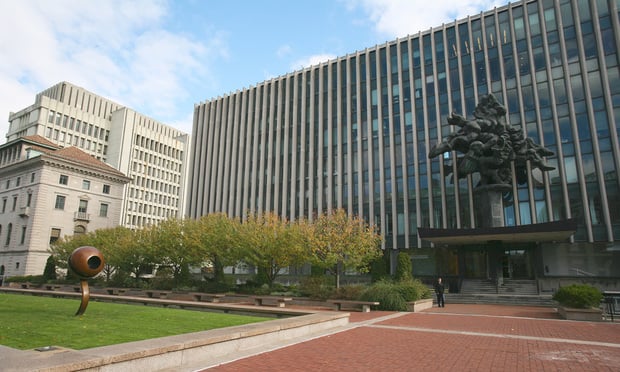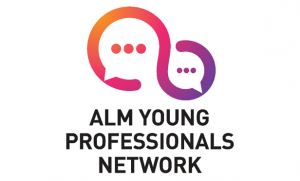Want to Work in Big Law? These Schools Are Good Bets
Columbia Law School lands at the top of our 2020 Go-To Law Schools ranking of Big Law feeder schools—marking the seventh straight year the school tops the list.
March 05, 2020 at 05:45 PM
7 minute read
 Columbia Law School.
Columbia Law School.
Columbia Law School has kept the streak alive.
For the seventh straight year, the law school sent a higher percentage of its graduates into associate jobs at the nation's largest 100 law firms than any other campus. Among the class of 2019, some 70% are now working as associates at those firms.
But Columbia isn't the only law school that made a consistent showing on the Big Law recruiting front last year. The top five schools on this year's annual Go-To Law Schools report remained unchanged from 2018. The University of Pennsylvania Law School snagged the No. 2 spot by sending 58% of recent grads to the largest firms, followed by New York University School of Law at 56%. Rounding out the top five are Northwestern University Pritzker School of Law at No. 4 with a Big Law placement rate of 55%, and the University of Virginia School of Law at No. 5 with 53% of the 2019 class heading to large firms.
For the full 2020 Go-To Law Schools report, click here.
Columbia's 70% Big Law placement rate for the class of 2019 was 12 percentage points higher than any other school, but it represents a slight drop for the school from 2018, when 71% of graduates went to Big Law. That decline is due to a slightly larger graduating class and to students opting for other career tracks.
"The last two years have been fairly strong, in terms of employment," said career services dean Marta Ricardo. "There was probably a slight uptick in clerkships and public interest, but overall, year-over-year, I think it's very comparable."
Each year, Law.com asks the largest 100 firms by attorney head count—as determined by the NLJ 500—to tell us the schools from which they hired their most recent class of first-year associates. We then use data on the school's graduating class size to determine the percentage of grads who took large firm jobs—which are highly sought after and lucrative. (The starting salary at many of the largest firms is now $180,000, with some firms paying new associates $190,000.)
This year's results highlight the fact that Big Law tends to rely on the same feeder schools over time, with relatively small annual adjustments. They also show that 2019 was a good year to graduate from a top school if you aspired to work in Big Law. The number of 2019 juris doctors hired as new associates by the largest 100 firms ticked up slightly in 2019 to 4,423, and more than 30% of graduates from the 50 schools on our list landed those jobs.
In fact, several career services deans said the class of 2019 likely represents a high mark in large firm hiring. Those new associates went through the summer associate recruiting process in 2017, when firm recruiting was fairly robust. Data compiled by the National Association for Law Placement (NALP) shows that some of the largest law firms have since reduced the sizes of their summer associate classes, meaning the graduating classes of 2020 and 2021 are likely to have lower Big Law placement rates.
At the same time, many law schools have in recent years modestly increased their class sizes, meaning slightly more students are vying for law firm jobs, which may also drive down the percentage of graduates finding jobs at large firms.
The pullback in summer associate recruiting by some large firms is tied in part to uncertainty about the economy and the upcoming election, said NALP executive director James Leipold.
"Firms don't want to be in a position where they have too many bodies on hand like they did in 2009, when they had to no-offer everybody and defer people for a year," he said. "But they don't want to be caught without a summer program. They don't want to have the 'no mid-level associates crisis' they ran into after 2010."
The reduction in summer associate class sizes was particularly noticeable during last fall's recruiting cycle, said Mark Weber, career services dean at Harvard Law School.
"We saw class sizes for the upcoming programs were reduced by, in many cases, anywhere from 10% to 30%," he said. "Big firms that had summer associate programs around 100 were down in the 60s. In the last few years, many of the largest firms have been scaling back. So if we go into a downturn, they will have already leveled off."
But those rollbacks didn't hit Harvard's class of 2019, which had the highest overall employment rate in at least two decades, Weber added.
While the top five law schools on the Go-To list were steady, some slight changes occurred among the remainder of the top 10. The University of Chicago Law School moved up three spots to No. 6, with a 51% large firm placement rate. The University of California, Berkeley School of Law jumped two spots to No. 8 and saw the percentage of graduates in large firm associate jobs increase from 42% in 2018 to 49% in 2019. Cornell Law School slipped thee spots to No. 9 with Big Law placement rate of 49%, while Harvard moved down two spots to No. 10.
Brooklyn Law School made the single-largest jump on this year's list, picking up 15 spots to land at No. 32. Its placement rate was helped by graduating fewer students in 2019, by a robust legal job market, and by the school's strong academic program, said career services dean Karen Eisen.
"We pay strong, personal attention to employer engagement, and, as a result, we've seen an increase in the number of employers coming to campus for summer associate recruiting," she said. "Our alumni in the top 100 firms certainly have enhanced our law school's reputation over the years, and their success has created even more opportunities for our students to obtain jobs; employers who hire Brooklyn graduates invariably come to us again."
New to the Go-To Law Schools list this year are: Temple University James E. Beasley School of Law; the University of Georgia School of Law; Chicago-Kent College of Law; the University of Connecticut School of Law; and the Antonin Scalia Law School at George Mason.
In addition to asking law firms to supply us with data on the schools from which they hired their new associates, we also queried them on the alma maters of their newest class of partners. Nearly all firms supplied those figures. For those that did not, we relied on data from ALM's Rival Edge database and independent reporting to determine their new associate figures.
As always, the Go-To Law Schools report doesn't capture the number of 2019 graduates who are currently in clerkships before continuing on to Big Law jobs, nor does it reflect recent graduates who took jobs at other private sector employers outside of the largest 100 law firms. It also excludes 2019 LL.M. graduates in associate jobs at those Big Law firms.
Most career services deans say they don't expect a rebound in large firm summer associate hiring this summer, given that recruiting has trended down for the past two cycles.
"Everyone has been preparing for the great recession to come," said Ricardo. "I don't know that it will, but some of [the decline in summer associate recruiting] is because they are hiring so far out so their targets are lower. I just hope that means more 3L hiring."
 ALM Young Professionals Network (YPN) is a LinkedIn group where young professionals can find inspiration and help in dealing with those challenges we all face early in our careers. From salary negotiations to leadership to addressing diversity and inclusion issues and more, our editors will guide conversations on how tomorrow's leaders can tackle every career milestone. We are excited about this pivotal group. Click here to join.
ALM Young Professionals Network (YPN) is a LinkedIn group where young professionals can find inspiration and help in dealing with those challenges we all face early in our careers. From salary negotiations to leadership to addressing diversity and inclusion issues and more, our editors will guide conversations on how tomorrow's leaders can tackle every career milestone. We are excited about this pivotal group. Click here to join.
This content has been archived. It is available through our partners, LexisNexis® and Bloomberg Law.
To view this content, please continue to their sites.
Not a Lexis Subscriber?
Subscribe Now
Not a Bloomberg Law Subscriber?
Subscribe Now
NOT FOR REPRINT
© 2025 ALM Global, LLC, All Rights Reserved. Request academic re-use from www.copyright.com. All other uses, submit a request to [email protected]. For more information visit Asset & Logo Licensing.
You Might Like
View All
The Week in Data Jan. 24: A Look at Legal Industry Trends by the Numbers


University of Chicago Accused of Evicting Student for Attending Gaza-Israel Protest
3 minute read
Sanctioned Penn Law Professor Amy Wax Sues University, Alleging Discrimination
5 minute readTrending Stories
- 1We the People?
- 2New York-Based Skadden Team Joins White & Case Group in Mexico City for Citigroup Demerger
- 3No Two Wildfires Alike: Lawyers Take Different Legal Strategies in California
- 4Poop-Themed Dog Toy OK as Parody, but Still Tarnished Jack Daniel’s Brand, Court Says
- 5Meet the New President of NY's Association of Trial Court Jurists
Who Got The Work
J. Brugh Lower of Gibbons has entered an appearance for industrial equipment supplier Devco Corporation in a pending trademark infringement lawsuit. The suit, accusing the defendant of selling knock-off Graco products, was filed Dec. 18 in New Jersey District Court by Rivkin Radler on behalf of Graco Inc. and Graco Minnesota. The case, assigned to U.S. District Judge Zahid N. Quraishi, is 3:24-cv-11294, Graco Inc. et al v. Devco Corporation.
Who Got The Work
Rebecca Maller-Stein and Kent A. Yalowitz of Arnold & Porter Kaye Scholer have entered their appearances for Hanaco Venture Capital and its executives, Lior Prosor and David Frankel, in a pending securities lawsuit. The action, filed on Dec. 24 in New York Southern District Court by Zell, Aron & Co. on behalf of Goldeneye Advisors, accuses the defendants of negligently and fraudulently managing the plaintiff's $1 million investment. The case, assigned to U.S. District Judge Vernon S. Broderick, is 1:24-cv-09918, Goldeneye Advisors, LLC v. Hanaco Venture Capital, Ltd. et al.
Who Got The Work
Attorneys from A&O Shearman has stepped in as defense counsel for Toronto-Dominion Bank and other defendants in a pending securities class action. The suit, filed Dec. 11 in New York Southern District Court by Bleichmar Fonti & Auld, accuses the defendants of concealing the bank's 'pervasive' deficiencies in regards to its compliance with the Bank Secrecy Act and the quality of its anti-money laundering controls. The case, assigned to U.S. District Judge Arun Subramanian, is 1:24-cv-09445, Gonzalez v. The Toronto-Dominion Bank et al.
Who Got The Work
Crown Castle International, a Pennsylvania company providing shared communications infrastructure, has turned to Luke D. Wolf of Gordon Rees Scully Mansukhani to fend off a pending breach-of-contract lawsuit. The court action, filed Nov. 25 in Michigan Eastern District Court by Hooper Hathaway PC on behalf of The Town Residences LLC, accuses Crown Castle of failing to transfer approximately $30,000 in utility payments from T-Mobile in breach of a roof-top lease and assignment agreement. The case, assigned to U.S. District Judge Susan K. Declercq, is 2:24-cv-13131, The Town Residences LLC v. T-Mobile US, Inc. et al.
Who Got The Work
Wilfred P. Coronato and Daniel M. Schwartz of McCarter & English have stepped in as defense counsel to Electrolux Home Products Inc. in a pending product liability lawsuit. The court action, filed Nov. 26 in New York Eastern District Court by Poulos Lopiccolo PC and Nagel Rice LLP on behalf of David Stern, alleges that the defendant's refrigerators’ drawers and shelving repeatedly break and fall apart within months after purchase. The case, assigned to U.S. District Judge Joan M. Azrack, is 2:24-cv-08204, Stern v. Electrolux Home Products, Inc.
Featured Firms
Law Offices of Gary Martin Hays & Associates, P.C.
(470) 294-1674
Law Offices of Mark E. Salomone
(857) 444-6468
Smith & Hassler
(713) 739-1250








